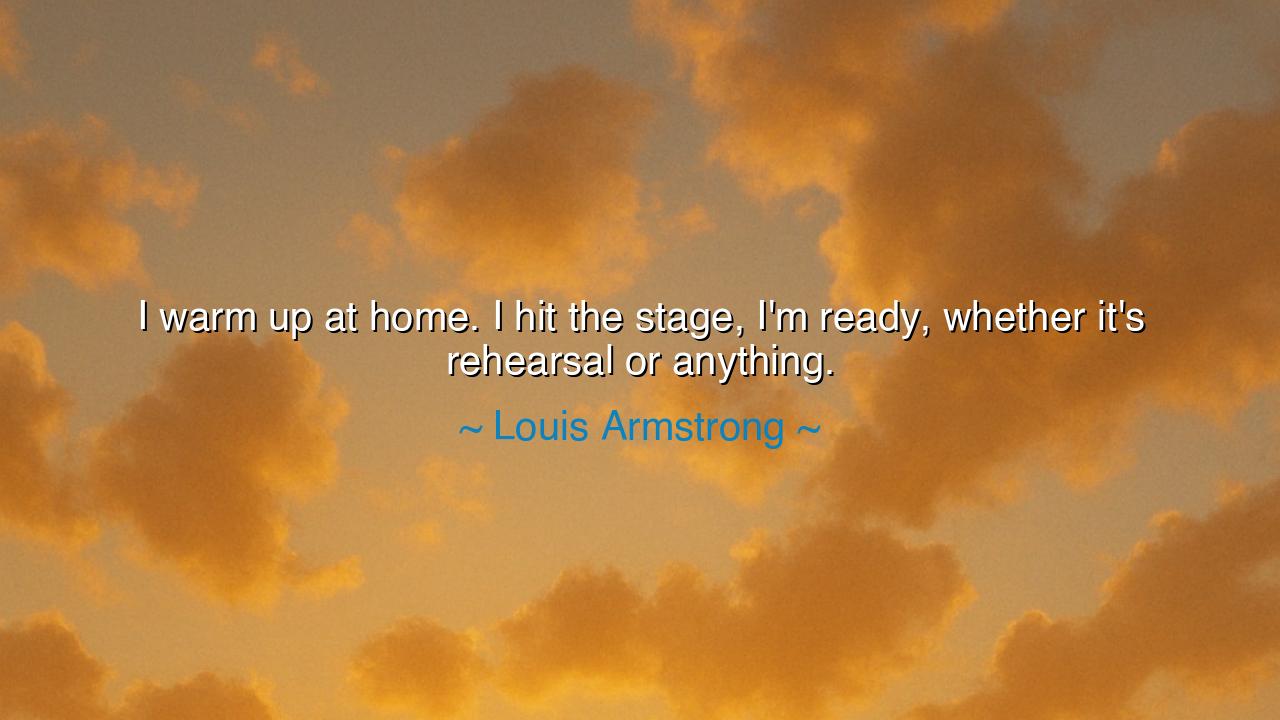
I warm up at home. I hit the stage, I'm ready, whether it's






In the timeless words of Louis Armstrong, “I warm up at home. I hit the stage, I’m ready, whether it’s rehearsal or anything,” we hear the creed of a man whose greatness was born not only from talent, but from discipline, humility, and devotion to his art. Beneath the simple rhythm of his statement lies a universal truth—that excellence is not a matter of performance, but of preparation. Armstrong’s words are not just about music; they are about life itself. He teaches us that mastery is forged in solitude, long before the applause, long before the world takes notice. For the true artist—and indeed, the true human being—greatness begins in the unseen hours.
The meaning of Armstrong’s words is both practical and profound. When he says, “I warm up at home,” he reveals the secret behind every enduring success: the quiet labor done when no one is watching. The stage—be it a concert hall, a workplace, or the stage of life—does not forgive those who come unprepared. Armstrong knew that every note, every breath of his trumpet, was born from hours of practice, reflection, and respect for his craft. To “be ready” at all times was not merely a professional choice—it was a spiritual one. He lived by the sacred rhythm of readiness, knowing that opportunity honors the prepared soul.
In the ancient world, such wisdom was spoken by masters in every art. The philosopher Aristotle said, “We are what we repeatedly do. Excellence, then, is not an act, but a habit.” The warrior trained his body long before battle; the orator practiced his speech long before the crowd gathered. The discipline that Armstrong speaks of is this same eternal principle—the devotion that transforms practice into instinct, and instinct into brilliance. When he stepped onto the stage, his readiness was not born of arrogance, but of reverence: reverence for the music, for the audience, and for the moment itself. He knew that to honor the art, one must first honor the preparation.
Consider, too, the story of Leonardo da Vinci, who spent countless hours sketching hands, faces, and shadows long before painting The Last Supper or Mona Lisa. He was mocked for his delays, for his obsession with detail, but da Vinci understood—as Armstrong did—that true creation cannot be rushed. The artist must warm up his soul before giving birth to beauty. So it is with the musician, the craftsman, and even the ordinary person striving toward purpose: one must prepare quietly so that when the moment comes, one’s heart and hands are in perfect harmony.
Armstrong’s philosophy was not about perfection, but about presence. When he said, “I hit the stage, I’m ready,” he was speaking of the sacred balance between effort and surrender. He did not merely perform; he became the music. His readiness allowed him to enter the moment completely, free from fear and doubt. This is the deeper meaning of his words: that preparation frees the spirit. When the body and mind are trained, the soul is liberated to create, to improvise, to soar. This is why Armstrong’s music felt alive—it was not just rehearsed, it was prepared for. The difference is subtle but eternal.
There is also a quiet humility in his statement, for Armstrong never saw himself as too great to rehearse. He understood that discipline is the language of respect—respect for his gift, for his fellow musicians, for the audience, and for the art itself. Even at the height of fame, he still “warmed up at home.” The lesson here is profound: the truly great never outgrow the fundamentals. The proud seek shortcuts; the wise return daily to the basics, sharpening their skills and renewing their spirit. In this, Armstrong stands beside the sages and saints of all ages—those who knew that greatness is not a moment of triumph, but a lifelong practice of devotion.
And so, dear listener, the lesson of Louis Armstrong’s words is this: whatever your stage in life may be, prepare before you arrive. Warm up in private. Refine your craft, your heart, your courage. Do not wait for the moment to come before you become ready; be ready always. Let preparation be your ritual, and constancy your offering. When the hour of opportunity dawns—and it surely will—you will not tremble, for you will have already faced yourself in the quiet hours when no one watched.
For as Armstrong reminds us, the world belongs to those who practice when unseen, who enter the stage already aflame with purpose. Warm up at home; be ready when life calls. That is how ordinary souls become legends, and how fleeting moments become eternal music.






AAdministratorAdministrator
Welcome, honored guests. Please leave a comment, we will respond soon